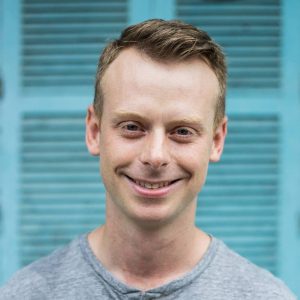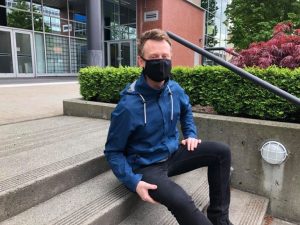Alumni entrepreneurs adjust to COVID curveball
What does a true entrepreneur do when the market throws a giant curveball?
Adjust.
Alex McAulay (BBA ’08) and Joel Primus are seasoned entrepreneurs who have teamed up to launch several businesses. Their latest? Kosan, a travel wear company they founded in 2017.
The problem?
Not many people are buying travel wear when international travel has slowed to a trickle.
“Up until about the last week of February our business was going on as usual and growing quickly month over month,” says McAulay, who was the inaugural winner of UFV’s Distinguished Young Alumni award in 2008 and was named one of UFV’s Top 40 alumni in 2014. “But within the first two weeks of March about 90% of our business dropped off. As a result, we had to lay off all four of our full-time staff.”
That didn’t sit well with McAulay and Primus (who also attended UFV). They decided to “pivot” their business and start making protective masks for the consumer market.
“There were several reasons we decided to pivot our business into protective masks. Our hunch was that masks would become an essential travel and everyday item, so we started to develop these products with a long-term view. As the COVID-19 crisis progressed we realized there was an immediate need now for both masks and other personal protective equipment (PPE) and we wanted to be part of that solution. Not only would this help keep Kosan alive, but it could help keep people protected, so we converted our supply chain immediately and haven’t slept much since!”
Thanks to some government subsidies and the recent pivot, McAulay and Primus are slowly trying to bring people back to work.

They are currently manufacturing the masks in Vancouver.
“Local manufacturers have been massively affected by the economic downturn, so it has been great to chip in,” says McAulay, pictured left.
The masks are not medical grade and are intended for use by the general public.
“Our reusable, washable, masks are waterproof, with an anti-bacterial lining,” MacAulay says. “These aren’t medical-grade masks, but they are estimated to be 70% as effective as medical-grade masks and more importantly, providing these masks to consumers will keep medical masks in the hands of nurses, doctors, and those front-line works who truly need them most.”
Kosan has also started to look into importing medically certified personal protective equipment for health care workers.
“We are also in the process of pulling capital and equipment together to start producing locally and are actively looking for partners on this venture,” says MacAulay.
Given that it’s uncertain how long travel will be curtailed by COVID-19, MacAulay and Primus are looking to make their business “pandemic proof.”
“We are going to continue down the road of sophisticating our whole supply chain around personal protective equipment, so that will be a separate line of business for us and create compact travel pandemic kits. The pandemic is also forcing us to refocus on more longer-cycle product development with the hopes that travel resumes in a year’s time or sooner, so that we’ll be ready to go with lots of new products.”


